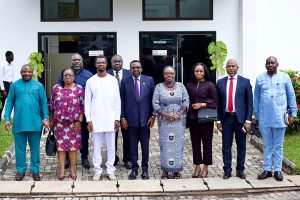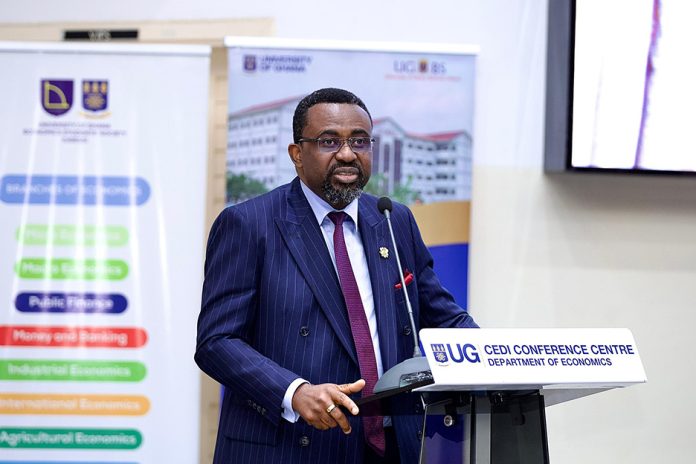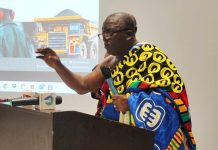The Governor of the Bank of Ghana, Dr. Johnson Pandit Asiama, has pledged to push average lending rates below 10% before the end of his tenure, describing it as both a personal and institutional commitment to Ghana’s economic transformation.
Addressing the gathering during the Inaugural Lecture of the Bank of Ghana Chair in Finance and Economics, held at the University of Ghana on August 5, 2025 Dr. Asiama declared that “before I leave office, we will see average lending rates not more than 10 percent.
“This is not just a target; it is a necessity if we are to unlock growth, support enterprises and deliver inclusive development.”

The Governor noted that the Ghanaian financial system has grown too dependent on government securities, with commercial banks investing over GH¢162 billion in public debt, almost double their gross loans to the private sector.
“This skew toward risk-free assets must be corrected. Banks must re-evaluate their business models. Our financial system must become a catalyst for growth, not a constraint,” he said.
Addressing students, academics and policymakers at the lecture themed: “From Cowries to Crypto: The Long Arc of Monetary Policy in Africa,” Dr.Asiama used the platform to reflect on the evolution of money in Ghana from indigenous barter systems and cowries to modern digital assets.
He emphasised that innovation must be embraced, but with systems that safeguard public trust. “The Ghana Cedi, whether in coin, note or code, must remain a symbol of national confidence and continuity.”
He revealed that the Bank of Ghana had taken decisive steps to regulate Ghana’s digital finance space, including piloting the e-Cedi and finalising licensing frameworks for Virtual Asset Service Providers (VASPs).
“Our fintech sandbox invites innovation, but within a framework that protects both the system and the consumer,” he said.
To ensure Ghana’s monetary policy is future-ready, Dr Asiama announced the Governor’s Future Leaders Fellowship, a strategic mentorship initiative to develop the next generation of Ghanaian economists and policymakers.
“They will return home to build, to lead and to ensure that the next chapter of Ghana’s economic transformation is written by Ghanaians who understand both global dynamics and national aspirations,” he stated.
The Chairperson of the event and Vice-Chancellor of the University of Ghana, Prof. Nana Aba AppiahAmfo, praised the launch as a ground-breaking moment in Ghana’s intellectual and policy landscape.
“This Chair is not merely an academic milestone. It is a platform for knowledge that is locally grounded and globally impactful,” she said.
Prof.Amfo stressed the urgent need for African-led research that reflects local contexts, describing imported economic models as often misaligned with Africa’s realities.
“Although they have contributed to stability, they frequently fail to reflect our distinct aspirations and resource base,” she explained.
The Vice-Chancellor also celebrated the appointment of Prof.Yegandi Imhotep Paul Alagidede as the inaugural Chairholder, citing his “visionary outlook rooted in African agency and innovation.”
She called on policymakers, researchers, and students to engage deeply with his proposed ‘Metanomics’ paradigm—an economic framework merging African indigenous logic with tools like blockchain and algorithmic design.
“This initiative aligns with the university’s strategic priorities of impactful research and stronger partnerships. We believe it will inform policy, inspire business leadership, and cultivate a vibrant pipeline of finance and economics professionals,” she said.
Prof. Amfo emphasised that the Chair was not just about funding or research, but about transformation. “Let us acknowledge this partnership as the beginning of a new era of indigenous, globally acclaimed thought leadership in the fields of finance and economics,” she urged.









